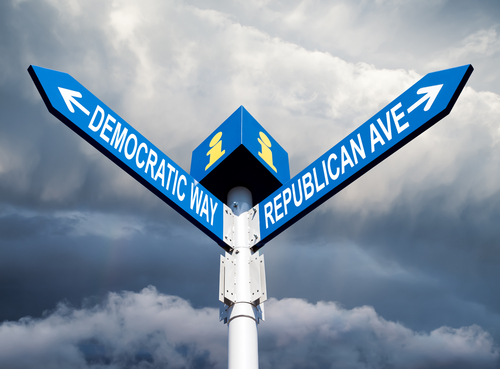Regardless of whether Democrats block science funding reform or not, we need to wonder why it took so many decades for Congress to figure out what everyone else knew. I think scientists have been wonderfully gracious in not turning the guns on this issue a long time ago. Part of it may be not wanting to make waves. Scientists rely on the National Science Foundation for funding and being critical of the NSF, even when $255 million of its budget goes to the The Social, Behavioral and Economics Directorate, is not a good idea. It's the price of turning over careers to government, and therefore political, control but playing the game is going to be necessary in any job.

But the reality of the last 40 years is this, whether scientists choose to accept the data or not; when Democrats are in charge, science funding flatlines or goes down. When Republicans are in charge, it goes up. And there is not much chance a Republican is going to be in charge for the next four years so the easiest way to increase science funding by $255 million is to stop allowing non-science funding at the NSF.
Gathering statistics does not equal science, an uncomfortable truth the social sciences and the humanities do not like to read. So be it. I have no billion-dollar media corporation telling me what to do, I get no government funding, I can be blunt in a way others cannot.
Well, apparently Jacqueline Stevens writing in the New York Times apparently can also - and she is professor of political science at Northwestern University so her determinations have special meaning; a lot of her friends are going to be pissed off at what she writes.
It’s an open secret in my discipline: in terms of accurate political predictions (the field’s benchmark for what counts as science), my colleagues have failed spectacularly and wasted colossal amounts of time and money. The most obvious example may be political scientists’ insistence, during the cold war, that the Soviet Union would persist as a nuclear threat to the United States.Maybe astrology is onto something. Astrologers were actually just as accurate as psychology students in doing personality assessments - even when the personality assessments the psychology students were reading were ones they had written about themselves.
In 1993, in the journal International Security, for example, the cold war historian John Lewis Gaddis wrote that the demise of the Soviet Union was “of such importance that no approach to the study of international relations claiming both foresight and competence should have failed to see it coming.” And yet, he noted, “None actually did so.” Careers were made, prizes awarded and millions of research dollars distributed to international relations experts, even though Nancy Reagan’s astrologer may have had superior forecasting skills.
'Experts' in Middle East political science and foreign policy never heard of the Ayatollah Khomeini before he took over Iran. He was not in any of the top 5 groups they recommended the Carter administration be 'developing' while he propped up the Shah. Disaster ensued.
As Stevens puts it, "Chimps randomly throwing darts at the possible outcomes would have done almost as well as the experts."
I am not saying political science has no value. Far from it. Without political science, Greenpeace, PETA and other activist organizations would get no new employees so they have their place - political science just isn't science. And it can't do predictions, any more than economics can, so stop funding people who cherry pick data, make terrible models and reaffirm barely interesting claims.
Good job, Congress. Now get rid of the National Center for Complementary and Alternative Medicine (NCCAM) and its funding for chelation therapy too.





Comments